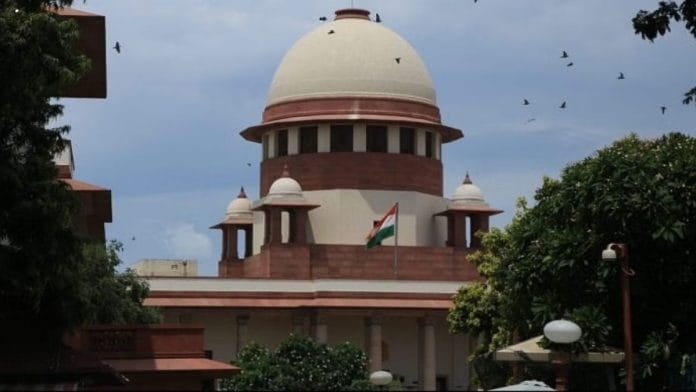New Delhi: Governments cannot give excuses like financial constraints to deny the regularisation of ad-hoc employees who have kept public institutions running, the Supreme Court has ruled, underlining the State is a constitutional employer which must be held to a higher standard.
In doing so, a bench of Justices Vikram Nath and Sandeep Mehta struck down two orders—passed by single and division benches of the Allahabad High Court in 2009 and later in 2017—which upheld the Uttar Pradesh government’s denial of the workers’ plea on grounds like the lack of vacancies and financial constraints.
“We believe that a non-speaking rejection on a generic plea of ‘financial constraints’, ignoring functional necessity and the employer’s own longstanding reliance on daily wagers to discharge regular duties, does not meet the standard of reasonableness expected of a model public institution,” it said.
Emphasising that public employment should be driven by principles of fairness, decision-making and respect for the dignity of one’s work, the court said, “When public institutions depend, day after day, on the same hands to perform permanent tasks, equity demands that those tasks are placed on sanctioned posts, and those workers are treated with fairness and dignity.”
In its 22-page order, the court said the question before it in the present case was whether ad-hoc workers, who are employed on a temporary basis but have kept public institutions running, can be denied rights, based on excuses like “financial strain”.
Financial stringency certainly has a place in public policy, but it cannot be used to override fairness, reason, and the duty to organise work on lawful lines, the court said.
Adhocism thrives when administration is opaque, the division bench also ruled, while saying that state departments should keep and provide accurate records and registers of outsourcing arrangements. “They must explain, with evidence, why they prefer precarious engagement over sanctioned posts where the work is perennial,” the court asked.
Finally, the top court said that sensitivity to human consequences of prolonged insecurity is not sentimentality, but a constitutional discipline.
Also Read: ‘How can you criminalise love?’ SC backs TN circular against hasty POCSO arrests in ‘romantic cases’
Why ad-hoc workers moved court
The case arose from a challenge to the February 2017 order of the division of the Allahabad HC, which upheld the dismissal of a plea filed by workers engaged on a daily-wage basis. In its order, the court had accepted the UP government’s claim that there were no vacant posts to give to these workers.
The workers were mainly class-IV employees, including peons, drivers and attendants, who were employed with the Uttar Pradesh Higher Education Services Commission between 1989 and 1992. Although the commission’s primary task was the recruitment of teachers and principals for state universities, it needed some support staff to aid the process.
The commission, established under the U.P. Higher Education Services Commission Act, 1980, processes large recruitment cycles for teachers and principals and requires “support for scrutiny of applications, dispatch, and connected administrative work”, the court noted.
By way of their plea, the workers had sought a direction to the state government to sanction or create 14 posts in the Commission, for Class III and IV posts, and to regularise their appointments with regular pay.
What the court ruled
Taking into consideration the perennial, all-year-round nature of the worker’s duties, their long and undisputed service, along with other material presented before the court, which showed that Class IV vacancies were available, the court set aside the earlier HC orders.
The bench also issued certain directions in the workers’ favour, like regularising of their posts, paying their salaries, and giving pension, gratuity and other dues to the retired employees too.
Although the court noted that the creation of posts is primarily an executive function, it pointed out that the state government’s refusal to sanction posts wasn’t immune from judicial scrutiny for arbitrariness.
Pointing to the undisputed nature of work performed by these ad-hoc workers, which included sorting and scrutiny of applications, dispatch, office support, and driving, the court noted that their work was “continuous” or perennial in nature. It was integral to the commission’s functioning as well, the court noted.
The court also observed that though the Commission had consistently demanded sanction of the posts, along with the “uninterrupted utilisation of the workers’ labour during regular office hours”, their positions were not regularised by the state government despite their decades-long service.
“To continue extracting such work for decades while pleading want of sanctioned strength is a position that cannot be sustained,” the court said.
Rejecting the UP government’s argument that there were no vacancies, the court said that the Right to Information (RTI) application from January 2010, revealed that there were indeed class-IV vacancies in the organisation. Apart from this, a decade later, in 2020, a plea was filed before the SC, informing it that there were at least five vacancies for class-IV posts, and one for the driver’s post too.
“The long-term extraction of regular labour under temporary labels corrodes confidence in public administration and offends the promise of equal protection,” the SC said.
(Edited by Ajeet Tiwari)
Also Read: When SC stepped in, summoned EVMs & reversed outcome of a panchayat poll in Haryana’s Panipat






